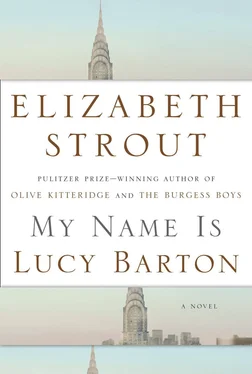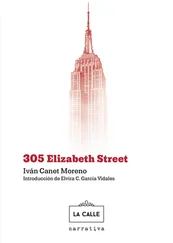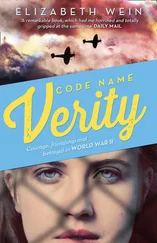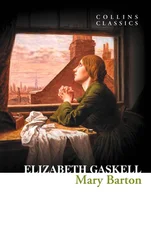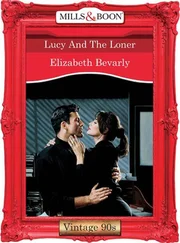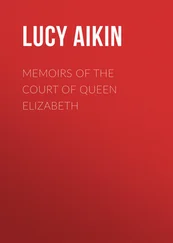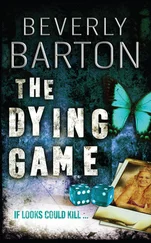Then my mother and I talked about the nurses; my mother named them right away: “Cookie,” for the skinny one who was crispy in her affect; “Toothache,” for the woebegone older one; “Serious Child,” for the Indian woman we both liked.
But I was tired, and so my mother started telling me stories of people she had known years before. She talked in a way I didn’t remember, as though a pressure of feeling and words and observations had been stuffed down inside her for years, and her voice was breathy and unselfconscious. Sometimes I dozed off, and when I woke I would beg her to talk again. But she said, “Oh, Wizzle-dee, you need your rest.”
“I am resting! Please, Mom. Tell me something. Tell me anything. Tell me about Kathie Nicely. I always loved her name.”
“Oh yes. Kathie Nicely. Goodness, she came to a bad end.”
We were oddities, our family, even in that tiny rural town of Amgash, Illinois, where there were other homes that were run-down and lacking fresh paint or shutters or gardens, no beauty for the eye to rest upon. These houses were grouped together in what was the town, but our house was not near them. While it is said that children accept their circumstances as normal, both Vicky and I understood that we were different. We were told on the playground by other children, “Your family stinks,” and they’d run off pinching their noses with their fingers; my sister was told by her second-grade teacher — in front of the class — that being poor was no excuse for having dirt behind the ears, no one was too poor to buy a bar of soap. My father worked on farm machinery, though he was often getting fired for disagreeing with the boss, then getting rehired again, I think because he was good at the work and would be needed once more. My mother took in sewing: A hand-painted sign, where our long driveway met the road, announced SEWING AND ALTERATIONS. And though my father, when he said our prayers with us at night, made us thank God that we had enough food, the fact is I was often ravenous, and what we had for supper many nights was molasses on bread. Telling a lie and wasting food were always things to be punished for. Otherwise, on occasion and without warning, my parents — and it was usually my mother and usually in the presence of our father — struck us impulsively and vigorously, as I think some people may have suspected by our splotchy skin and sullen dispositions.
And there was isolation.
We lived in the Sauk Valley Area, where you can go for a long while seeing only one or two houses surrounded by fields, and as I have said, we didn’t have houses near us. We lived with cornfields and fields of soybeans spreading to the horizon; and yet beyond the horizon was the Pedersons’ pig farm. In the middle of the cornfields stood one tree, and its starkness was striking. For many years I thought that tree was my friend; it was my friend. Our home was down a very long dirt road, not far from the Rock River, near some trees that were windbreaks for the cornfields. So we did not have any neighbors nearby. And we did not have a television and we did not have newspapers or magazines or books in the house. The first year of her marriage, my mother had worked at the local library, and apparently — my brother later told me this — loved books. But then the library told my mother the regulations had changed, they could only hire someone with a proper education. My mother never believed them. She stopped reading, and many years went by before she went to a different library in a different town and brought home books again. I mention this because there is the question of how children become aware of what the world is, and how to act in it.
How, for example, do you learn that it is impolite to ask a couple why they have no children? How do you set a table? How do you know if you are chewing with your mouth open if no one has ever told you? How do you even know what you look like if the only mirror in the house is a tiny one high above the kitchen sink, or if you have never heard a living soul say that you are pretty, but rather, as your breasts develop, are told by your mother that you are starting to look like one of the cows in the Pedersons’ barn?
How Vicky managed, to this day I don’t know. We were not as close as you might expect; we were equally friendless and equally scorned, and we eyed each other with the same suspicion with which we eyed the rest of the world. There are times now, and my life has changed so completely, that I think back on the early years and I find myself thinking: It was not that bad. Perhaps it was not. But there are times, too — unexpected — when walking down a sunny sidewalk, or watching the top of a tree bend in the wind, or seeing a November sky close down over the East River, I am suddenly filled with the knowledge of darkness so deep that a sound might escape from my mouth, and I will step into the nearest clothing store and talk with a stranger about the shape of sweaters newly arrived. This must be the way most of us maneuver through the world, half knowing, half not, visited by memories that can’t possibly be true. But when I see others walking with confidence down the sidewalk, as though they are free completely from terror, I realize I don’t know how others are. So much of life seems speculation.
“The thing about Kathie,” my mother said, “the thing about Kathie was…” My mother leaned forward in her chair and tilted her head with her hand to her chin. Gradually I saw how, in the years since I had last known her, she had gained just enough weight to cause her features to soften; her glasses were no longer black but beige, and the hair beside her face had turned paler, but not gray, so she seemed a slightly larger, fuzzier version of her younger self.
“The thing about Kathie,” I said, “is that she was nice.”
“I don’t know,” my mother said. “I don’t know how nice she was.” We were interrupted by the nurse Cookie, who walked into the room with her clipboard, then held my wrist and took my pulse, gazing into the air, her blue eyes far away. She took my temperature, glanced at the thermometer, wrote something on my chart, and walked out of the room. My mother, who had been watching Cookie, now gazed out the window. “Kathie Nicely always wanted more. I often thought the reason she was friends with me — oh, I don’t know if you could call us friends, really, I just sewed for her and she paid me — but I’ve often thought the reason she would stay and talk — well, she did have me over to her place when her troubles arrived — but what I’m trying to say here is that I always thought she liked my circumstances being so much lower than her own. She couldn’t envy anything about me. Kathie always wanted something she didn’t have. She had those beautiful daughters, but they weren’t enough, she wanted a son. She had that nice house in Hanston, but it wasn’t nice enough, she wanted something closer to a city. What city? That’s how she was.” And then plucking something from her lap, squinting, my mother added in a lower voice: “She was an only child, I think that had something to do with it, how self-centered they can be.”
I felt the cold-hot shock that comes from being struck without warning; my husband was an only child, and my mother had told me long before that such a “condition,” as she put it, could only lead to selfishness in the end.
My mother went on: “Well, she was jealous. Not of me, of course. But for example, Kathie wanted to travel. And her husband wasn’t like that. He wanted Kathie to be content and stay at home and they would live off his salary. He did well, he managed a farm of feed corn, you know. They had a perfectly nice life, anyone would have wanted their life, really. Why, they went to dances at some club! I’ve not been to a dance since high school. Kathie would come to me and get a new dress made just to go to a dance. Sometimes she brought the girls over, such pretty little things and well behaved. I always remember the first time she brought them over. Kathie said to me, ‘May I present the pretty Nicely girls.’ And when I started to say, ‘Oh, they’re lovely indeed,’ she said, ‘No — that’s what they’re called at their school, in Hanston, the Pretty Nicely Girls.’ Now, how does that feel, I’ve always wondered. To be known as a Pretty Nicely Girl? Though once,” my mother said, in her urgent voice, “I caught one of them whispering to her sisters something about our place smelling funny—”
Читать дальше
